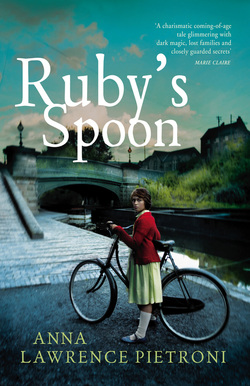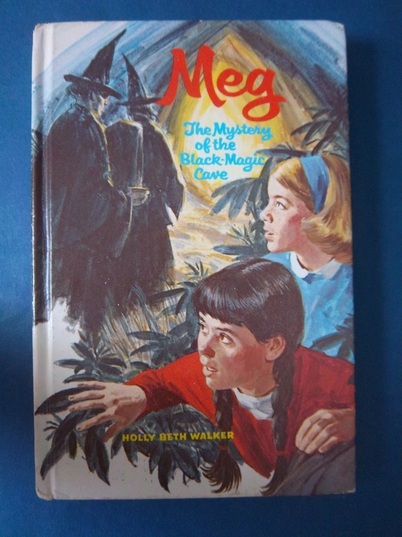 Somehow, I ran into Ruby's Spoon at the dollar store. How on earth this novel got to a PA dollar store, I will never know, but I consider myself quite fortunate. I don't feel quite up to the task of reviewing this novel; I can only write of my experience of it. I wasn't sure I'd make it through this book, because the people in this narrative felt so strange and foreign to me. I had trouble imagining this odd world in which a motherless little girl cannot cross a bridge to touch her father. Most reviewers mention the dialect as an obstacle to fluency, but it wasn't quite as difficult for me to navigate as was the odd behavior of the people. Yet, somehow, I found myself slowly moving under its spell. It took me months to get through the first fourth of the book; I kept losing it. Finally, I found my way and then "I couldn't put it down." Trite, but true. If I were to go back in time and pick up this novel for the first time again, I would treat it more like an academic exercise. I would print out a copy of the map, and write down a character description of each one along with his or her relationship to the others in the town. Having said that, I don't think it is valid criticism when reviewers mention that it is a difficult read or "hard to get into." It simply doesn't belong in the light read category and challenges the reader to pay attention and be aware. I was approaching this as a lazy, summer read, (probably because I bought it for a dollar), yet it is anything but. Maybe this post will scare people off of reading Ruby's Spoon, but I hope not, because the companion to the challenge of this read was the fact that I was bewitched by it. At first I didn't understand thirteen-year-old Ruby's desperation for attention from the mysterious newcomer, Isa Fly. Perhaps I had lost touch of how much I sought the approval and company of older women when I was a child. (I'm sure that somewhere in my writing I have mentioned a certain dark-skinned woman with a high IQ and a white bikini. From age eight to eighteen I worshiped her, nearly believing that her companionship could turn me into a dark-skinned, bikini clad genius.) So I think the reader can start there, perhaps, by remembering the pure idolatry that a child is capable of. That there might be reasons beyond Ruby's loneliness for her deep desire to connect with Isa makes it all the more fascinating. Another element here is the aloof behavior of so many people in the town toward Ruby; they fail terribly at the "it takes a village" idea. I kept wondering why everybody seemed so intolerant and often hostile toward her. Some of the women were deeply cruel to her, but it was the removed behavior of those who could have shown her that they cared that had me shaking my head. Then again, this rings with some authenticity from my own experience as a teenager. When I lost my parents at the age of seventeen, there were many words of sympathy, but actions that might disrupt someone's life (or even inconvenience them) were rare. Perhaps this place and its people are not so foreign to me after all? For me, one of the only elements of Ruby's life that I cannot understand is why she had no friends her own age. It is mentioned once or twice, I think, that she used to play with her school chums, but there is no other central character under the age of thirty. I imagine in the life of a small town teenager, a girlfriend would be a vital connection to a girl like Ruby, There is so much to read out there, and so little time. I am ultimately glad that I picked up Ruby's Spoon and I'd be the first one to buy a ticket if it were made into a film. Hopefully Anna Lawrence Pietroni will make a bunch of money off of it, thereby relieving my guilt of getting it from the dollar store. And while I'm imagining wonderful events -- let's hope that Vera Farmiga produces the film and takes the part of Isa Fly. (That's a working title -- do you like it?) Sometimes I make plans and fail to follow through. My mind can spin off in all sorts of different directions, yet I can only follow one path at a time. The closest I have come to multitasking is cleaning the kitchen while singing to Crosby, Stills, Nash & Young. A few months ago, I decided to start on the sequel to Dark Corner, but I never got anywhere with that. I was distracted by all kinds of projects, some necessary, others not so much.
Finally, I am ready, inspired by yet another review expressing the hope that the next book will follow soon. I empathize with that, because as I child I wrote a letter to author Holly Beth Walker basically begging her to write another "Meg Duncan Mystery." (The publishing company wrote back to tell me that Holly Beth Walker did not exist, but was a pseudonym for a number of authors. They also informed me that the company had no plans to publish another book. Nice, huh?) Here is a link to the review from Fresh Fiction by the way: DARK CORNER So, obviously I'm not giving away any secrets, but I am happy to say I do know where the main plot is heading and I have a good idea of each character's path. This installment is about Robin's search for her father who went missing when she was little. I'm very pleased with it and I'm looking forward to watching the story grow. Fortunately, that is how it works for me -- once I get the big decisions made (e.g. how exactly will the mystery of the missing dad be solved), then I have the experience of watching it write itself. I know it's going through my brain and out my arms and through my fingers, but it feels more like channeling a spirit. I guess that's why I have such an interest in channeling (aside from knowing a lady who could do it and reading most of the Seth books). I can't channel spirits, but I do get the idea of having a story flow through me while it feels like I am just a spectator rather than the creator. The weirdest part of that is how often I look back on my writing from just a few days previous and I have no recollection of writing it! Maybe I've got dissociative identity disorder, but whatever it is, it doesn't disturb me. Maybe the dissociation allows me to write without worrying about whether it's "good." Worrying about quality or reviews is just paralyzing to a writer. So, no need to procrastinate. Off I go! |
About the Author:
|



 RSS Feed
RSS Feed
